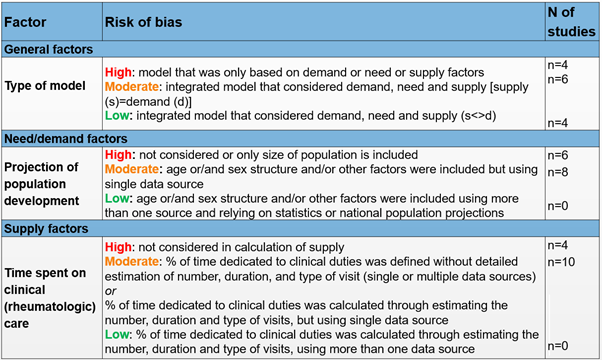Session Information
Session Type: ACR/ARHP Combined Abstract Session
Session Time: 9:00AM-11:00AM
Background/Purpose:
The projections from existing workforce studies in rheumatology vary by a factor of five, largely due to methodological heterogeneity. The purpose of this study was threefold: 1) to summarise the available information on physician workforce modelling, 2) to develop a rheumatology workforce prediction risk-of-bias tool and 3) to apply it to existing studies in rheumatology.
Methods:
A systematic literature review (SLR) was performed in key electronic databases (1946-2017) comprising an update of an SLR in rheumatology and a hierarchical SLR in other medical fields. We extracted data on type of model used, details on need, demand and supply factors considered in the model, and other relevant aspects such as regional heterogeneity or uncertainty analyses. Based on the results, key general as well as specific need/demand, and supply factors for workforce calculation in rheumatology were identified and each factor was assigned a risk of bias level (low, moderate, high). The workforce prediction risk of bias tool was developed and applied to existing workforce studies in rheumatology.
Results:
In total, 14 studies in rheumatology and 10 studies in other medical fields were included. Studies used a variety of prediction models based on a heterogeneous set of need/demand and/or supply factors. Only two studies attempted empirical validation of the prediction quality of the model. Based on evidence and consensus, the newly developed risk of bias tool includes 21 factors: general factors (e.g. type of the model, stakeholder involvement), need/demand factors (e.g. scope of diseases covered by rheumatologists, morbidity, demography) and supply factors (e.g. time dedicated to clinical work, entry to profession, demographic composition of workforce). The majority of studies revealed high or moderate risk of bias for most of the factors (Table).
Conclusion:
The existing evidence on workforce prediction in rheumatology is scarce, heterogeneous and at moderate or high risk of bias. The new risk of bias tool should enable future evaluation of workforce prediction studies. This review informs the EULAR points to consider for the conduction of workforce requirement studies in rheumatology.
Table. Example of application of the workforce prediction risk of bias tool to rheumatology workforce studies (in total, 21 factors were evaluated)
To cite this abstract in AMA style:
Putrik P, Unger J, Buttgereit F, Aletaha D, Bianchi G, Bijlsma JWJ, Boonen A, Cikes N, Madruga Dias J, Falzon L, Finckh A, Gossec L, Kvien T, Matteson EL, Sivera F, Stamm T, Szekanecz Z, Wiek D, Zink A, Dejaco C, Ramiro S. Workforce Requirements in Rheumatology: A Systematic Literature Reviewinforming the Development of a Workforce Prediction Risk of Bias Tool and the EULAR Points to Consider [abstract]. Arthritis Rheumatol. 2018; 70 (suppl 9). https://acrabstracts.org/abstract/workforce-requirements-in-rheumatology-a-systematic-literature-reviewinforming-the-development-of-a-workforce-prediction-risk-of-bias-tool-and-the-eular-points-to-consider/. Accessed .« Back to 2018 ACR/ARHP Annual Meeting
ACR Meeting Abstracts - https://acrabstracts.org/abstract/workforce-requirements-in-rheumatology-a-systematic-literature-reviewinforming-the-development-of-a-workforce-prediction-risk-of-bias-tool-and-the-eular-points-to-consider/

